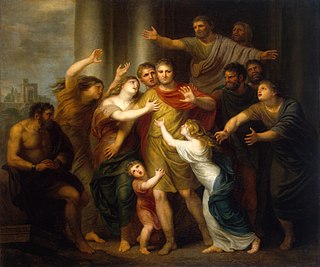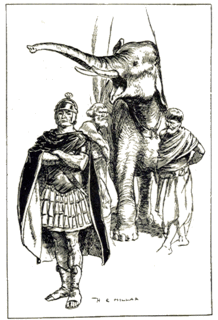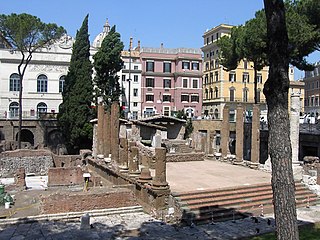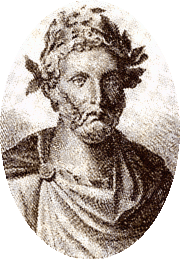 W
WLucius Aemilius Paullus Macedonicus was a two-time consul of the Roman Republic and a noted general who conquered Macedon, putting an end to the Antigonid dynasty in the Third Macedonian War.
 W
WLucius Aemilius Paullus was a Roman consul twice, in 219 and 216 BC.
 W
WLucius Livius Andronicus was a Greco-Roman dramatist and epic poet of the Old Latin period. He began as an educator in the service of a noble family at Rome by translating Greek works into Latin, including Homer's Odyssey. They were meant at first as educational devices in the school he founded. He wrote works for the stage—both tragedies and comedies—which are regarded as the first dramatic works written in the Latin language of ancient Rome. His comedies were based on Greek New Comedy and featured characters in Greek costume. Thus, the Romans referred to this new genre by the term comoedia palliata. The Roman biographer Suetonius later coined the term "half-Greek" of Livius and Ennius. The genre was imitated by the next dramatists to follow in Andronicus' footsteps and on that account he is regarded as the father of Roman drama and of Latin literature in general; that is, he was the first man of letters to write in Latin. Varro, Cicero, and Horace, all men of letters during the subsequent Classical Latin period, considered Livius Andronicus to have been the originator of Latin literature. He is the earliest Roman poet whose name is known.
 W
WMarcus Atilius Regulus was a Roman statesman and general who was a consul of the Roman Republic in 267 BC and 256 BC.
 W
WQuintus Catius was an officer (legatus) of the Roman Republic during the Second Punic War.
 W
WMarcus Porcius Cato, also known as Cato the Censor, the Elder and the Wise, was a Roman soldier, senator and historian known for his conservatism and opposition to Hellenization. He was the first to write history in Latin with his Origines. His epithet "Elder" distinguishes him from his equally famous great-grandson Cato the Younger, who opposed Julius Caesar.
 W
WAppius Claudius Crassus Caecus was an important statesman of the Roman Republic, who was active between 315 and 278. He served as a Roman censor between 312 and 308, and then a consul twice, once in 307 and once in 296, dictator c. 285, he also served as a interrex three separate times. Appius Claudius Caecus is an integral part of Roman history due to the fact that he is the first Roman whose life can be traced with historical certainty.
 W
WMarcus Claudius Marcellus, five times elected as consul of the Roman Republic, was an important Roman military leader during the Gallic War of 225 BC and the Second Punic War. Marcellus gained the most prestigious award a Roman general could earn, the spolia opima, for killing the Gallic military leader and king Viridomarus in hand-to-hand combat in 222 BC at the Battle of Clastidium. Furthermore, he is noted for having conquered the fortified city of Syracuse in a protracted siege during which Archimedes, the famous mathematician, scientist, and inventor, was killed. Marcus Claudius Marcellus died in battle in 208 BC, leaving behind a legacy of military conquests and a reinvigorated Roman legend of the spolia opima.
 W
WGaius Claudius Nero was a Roman general active during the Second Punic War against the invading Carthaginian force, led by Hannibal Barca. He should not be confused with the Roman Emperor Nero. During a military career that began as legate in 214 BC, he was propraetor in 211 BC during the siege of Capua, before being sent to Spain that same year. He became consul in 207 BC.
 W
WPublius Cornelius Scipio Africanus was a Roman general and later consul who is often regarded as one of the best military commanders and strategists of all time. His main achievements were during the Second Punic War. His greatest military achievement was the defeat of Hannibal at the Battle of Zama in 202 BC. The victory was one of the feats that earned him the agnomen he is best known for: Africanus.
 W
WLucius Cornelius Scipio Barbatus was one of the two elected Roman consuls in 298 BC. He led the Roman army to victory against the Etruscans near Volterra. A member of the noble Roman family of Scipiones, he was the father of Lucius Cornelius Scipio and Gnaeus Cornelius Scipio Asina and great-grandfather of Scipio Africanus.
 W
WPublius Cornelius Scipio was a general and statesman of the Roman Republic and the father of Scipio Africanus.
 W
WManius Curius Dentatus, son of Manius, was a three-time consul and a plebeian hero of the Roman Republic, noted for ending the Samnite War. According to Pliny, he was born with teeth, thus earning the cognomen Dentatus, "Toothed."
 W
WQuintus Ennius was a writer and poet who lived during the Roman Republic. He is often considered the father of Roman poetry. He was born in Rudiae, formerly a small town located near modern Lecce in the heel of Italy, and could speak Oscan as well as Latin and Greek. Although only fragments of his works survive, his influence in Latin literature was significant, particularly in his use of Greek literary models.
 W
WQuintus Fabius Maximus Verrucosus, surnamed Cunctator, was a Roman statesman and general of the third century BC. He was consul five times and was appointed dictator in 221 and 217 BC. He was censor in 230 BC. His agnomen, Cunctator, usually translated as "the delayer", refers to the strategy that he employed against Hannibal's forces during the Second Punic War. Facing an outstanding commander with superior numbers, he pursued a then-novel strategy of targeting the enemy's supply lines, and accepting only smaller engagements on favourable ground, rather than risking his entire army on direct confrontation with Hannibal himself. As a result, he is regarded as the originator of many tactics used in guerrilla warfare.
 W
WQuintus Fabius Maximus was a consul of the Roman Republic in 213 BC. He was the son of Quintus Fabius Maximus Verrucosus, the famous dictator who invented Fabian strategy, and served with his father during the Second Punic War.
 W
WGaius Fabricius Luscinus Monocularis, son of Gaius, was said to have been the first of the Fabricii to move to ancient Rome, his family originating from Aletrium.
 W
WGaius Flaminius C. f. L. n. was a leading Roman politician in the third century BC. Twice consul, in 223 and 217, Flaminius is notable for the Lex Flaminia, a land reform passed in 232, the construction of the Circus Flaminius in 221, and his death at the hands of Hannibal's army at the Battle of Lake Trasimene in 217, during the Second Punic War. Flaminius is celebrated by ancient sources as being a skilled orator and a man possessed of great piety, strength, and determination. He is, however, simultaneously criticised by ancient writers such as Cicero and Livy for his popular policies and disregard of Roman traditions, particularly during the terms of his tribunate and second consulship.
 W
WGnaeus Fulvius Maximus Centumalus was a military commander and politician from the middle period of the Roman Republic, who became consul in 298 BC. He fought in the final wars against the Etruscans and later led armies in the Third Samnite War. He was appointed dictator in 263 BC with responsibility for overseeing the start of the Roman ship building effort in the First Punic War.
 W
WLucius Julius L. f. L. n. Libo was a member of the ancient patrician house of the Julii, who held the consulship in 267 BC, and won an important military victory.
 W
WGaius Lutatius Catulus was a Roman statesman and naval commander in the First Punic War. He was born a member of the plebeian gens Lutatius. His cognomen "Catulus" means "puppy". There are no historical records of his life prior to consulship, but his career probably followed the standard cursus honorum, beginning with service in the cavalry and continuing with the positions of military tribune and quaestor.
 W
WAulus Manlius Torquatus Atticus was a politician during the Roman Republic. Born into the prominent patrician family of the Manlii Torquati, he had a distinguished career, becoming censor in 247 BC, then twice consul in 244 and 241 BC, and possibly princeps senatus in 220 BC. Despite these prestigious magistracies, little is known about his life. He was a commander who served during the First Punic War, and might have pushed for the continuation of the war even after Carthage had sued for peace following the Roman victory at the Aegate Islands in 241 BC. The same year, he suppressed the revolt of the Faliscans in central Italy, for which he was awarded a triumph. At this occasion, he may have introduced the cult of Juno Curitis at Rome.
 W
WPublius Manlius Vulso was a member of the Roman patrician gens Manlia. In 210 BC he was praetor of Sardinia.
 W
WGnaeus Naevius was a Roman epic poet and dramatist of the Old Latin period. He had a notable literary career at Rome until his satiric comments delivered in comedy angered the Metellus family, one of whom was consul. After a sojourn in prison he recanted and was set free by the tribunes. After a second offense he was exiled to Tunisia, where he wrote his own epitaph and committed suicide. His comedies were in the genre of Palliata Comoedia, an adaptation of Greek New Comedy. A soldier in the Punic Wars, he was highly patriotic, inventing a new genre called Praetextae Fabulae, an extension of tragedy to Roman national figures or incidents, named after the Toga praetexta worn by high officials. Of his writings there survive only fragments of several poems preserved in the citations of late ancient grammarians.
 W
WTitus Maccius Plautus, commonly known as Plautus, was a Roman playwright of the Old Latin period. His comedies are the earliest Latin literary works to have survived in their entirety. He wrote Palliata comoedia, the genre devised by the innovator of Latin literature, Livius Andronicus. The word Plautine refers to both Plautus's own works and works similar to or influenced by his.
 W
WLucius Postumius Megellus was a politician and general during the middle years of the Roman Republic. Reportedly an arrogant and overbearing man, he was elected consul in 305 BC. The Second Samnite War was ongoing, and as consul he led troops against the Samnites. He defeated them at the Battle of Bovianum and took the town of Bovianum, which caused the Samnites to sue for peace, ending the war. Megellus was awarded a triumph.
 W
WMarcus Servilius C. f. P. n. Pulex Geminus was a Roman statesman during the Second Punic War, and the early decades of the second century BC. He was a renowned warrior, whose martial prowess was commemorated on coins issued by several of his descendants.